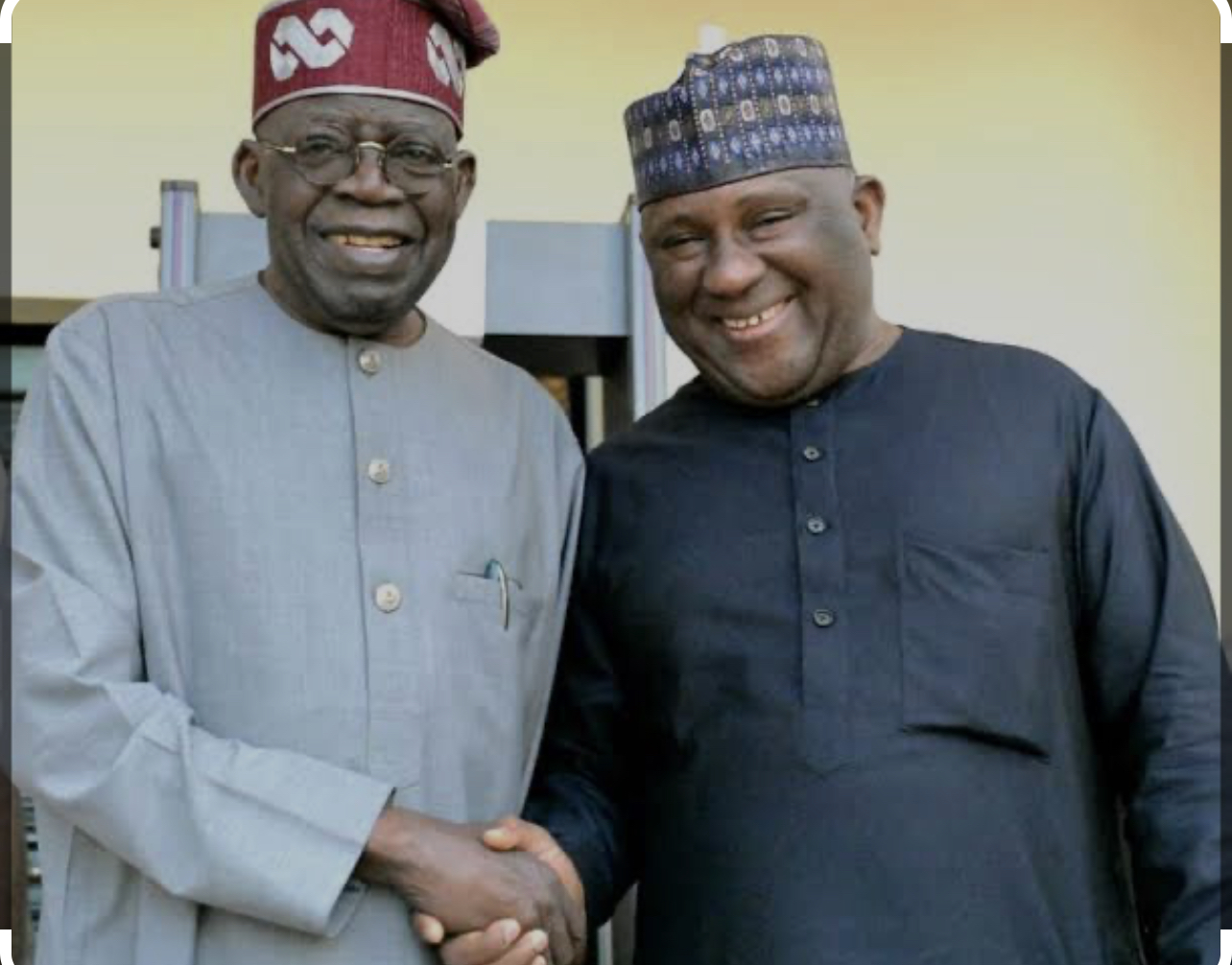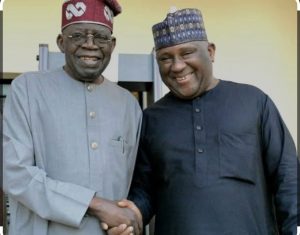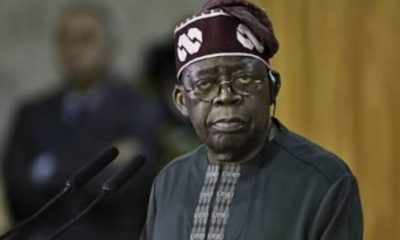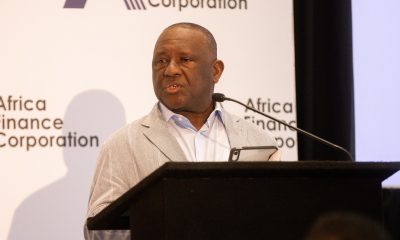Business
Abdul Samad Rabiu, Elumelu, Dangote make Tinubu’s economic advisory panel

Abdul Samad Rabiu, Elumelu, Dangote make Tinubu’s economic advisory panel
President Bola Tinubu has created an economic advisory committee comprising the federal government, sub-nationals and the private sector.
This resulted from talks between the President and key stakeholders at the State House, Abuja, on Sunday evening.
The development came as the falling naira exchange rate, rising inflation and other economic headwinds have continued to worsen the cost of living crisis.
Some of the prominent members of the private sector that made the list include the Chairman of United Bank for Africa, Mr. Tony Elumelu, and the Chairman of Dangote Group, Aliko Dangote.
Speaking at the meeting on behalf of the federal government, Tinubu said the goal “is to provide additional efforts” in stabilising the economy and ensuring the “best economic future” for Nigerians.
He said, “Let’s look at what we’re doing right and what we’re doing wrong to bring life back to the economy. As I have said many times, the people of this country are only the people we have to please.
“And we are very much concerned from students to mothers and fathers, farmers, the traders and realising that everyone of us will have to fetch water from the same well. We’re looking for additional efforts that’s might help the downtrodden Nigerians and we will provide hope and reassurance that economic recovery is on its way.
“We are not saying that we have all the answers. But we will not be blamed for not trying. We assure Nigerians that we will do our best to get our marshall plan in place and fashion out the best economic future for this country.”
At the meeting, Tinubu discussed food security, job creation and the exchange rate.
Dangote, who was part of the private sector delegation on the committee, said Sunday’s gathering stakeholders the opportunity to clarify the specifics of their roles in President Tinubu’s Renewed Hope Agenda.
He explained, “I think we had a very good meeting. What we discussed is generally about the economy, food security and security of the nation. We discussed everything in detail.
“The economic presidential advisory committee which has been set up…will look at all the issues and address them, coming from job creation and food security.
“So, all these things have been discussed in detail. I can’t give you all the details right now, but we are hopeful and we’re a great nation. We have what it takes to turn around the economy and we’re going to do that.”
Meanwhile, Elumelu noted implementing the decisions made that the gathering “will have propel our economy and help alleviate the poverty in the land, help create employment and help put food on the table of Nigerians.”
The Chairman of the BUA Group, Abdul Samad Rabiu, revealed that the committee held frank and exhaustive discussions with the President on the foreign exchange rate.
Citing the recent volatility of the naira against the dollar, Rabiu said, “We discussed on how to bring the foreign exchange rate down because we all know that what is happening as regards the foreign exchange is artificial. It is manipulative and thank God the CBN is doing quite a lot.”
Meanwhile, states have expressed readiness to partner with the federal government’s welfare interventions to alleviate the hardship on Nigerians. They said the advisory committee’s decision would only yield results when execution is prioritised.
Governor Dapo Abiodun of Ogun State said, “As a governor, I can assure you that all hands on deck. All governors have resolved to join hands with Mr president to ensure that he provides the necessary intervention to cushion the effect of what we’re going through while we are waiting for the implementation and the evidence of the fiscal and monetary policies already in place.
“In my state and other states, we are bringing in rice, we’re bringing food items and selling at rates that can be obtained before the downslide of the naira. So we are going to be doing all these to bring succour to the common man until we begin to see the evidence of the fiscal and monetary policies.”
On his part, Governor Charles Soludo of Anambra State said the tripartite committee “will be meeting from time to time to evaluate how things are going and make recommendations to Mr. President and the nation as well.”
The Director-General of the Manufacturers Association of Nigeria, Mr Segun Ajayi-Kadir, affirmed that the private sector “will play a very significant role” in promulgating workable recommendations to the President on economic matters.
Bank
Alpha Morgan to Host 19th Economic Review Webinar

Alpha Morgan to Host 19th Economic Review Webinar
In an economy shaped by constant shifts, the edge often belongs to those with the right information.
On Wednesday, February 25, 2026, Alpha Morgan Bank will host the 19th edition of its Economic Review Webinar, a high-level thought leadership session designed to equip businesses, investors, and individuals with timely financial and economic insight.
The session, which will hold live on Zoom at 10:00am WAT and will feature economist Bismarck Rewane, who will examine the key signals influencing Nigeria’s economic direction in 2026, including policy trends, market movements, and global developments shaping the local landscape.
With a consistent track record of delivering clarity in uncertain times, the Alpha Morgan Economic Review continues to provide practical context for decision-making in a dynamic environment.
Registration for the 19th Alpha Morgan Economic Review is free and can be completed via https://bit.ly/registeramerseries19
It is a bi-monthly platform that is open to the public and is held virtually.
Visit www.alphamorganbank to know more.
Business
GTBank Launches Quick Airtime Loan at 2.95%

GTBank Launches Quick Airtime Loan at 2.95%
Guaranty Trust Bank Ltd (GTBank), the flagship banking franchise of GTCO Plc, Africa’s leading financial services group, today announced the launch of Quick Airtime Loan, an innovative digital solution that gives customers instant access to airtime when they run out of call credit and have limited funds in their bank accounts, ensuring customers can stay connected when it matters most.
In today’s always-on world, running out of airtime is more than a minor inconvenience. It can mean missed opportunities, disrupted plans, and lost connections, often at the very moment when funds are tight, and options are limited. Quick Airtime Loan was created to solve this problem, offering customers instant access to airtime on credit, directly from their bank. With Quick Airtime Loan, eligible GTBank customers can access from ₦100 and up to ₦10,000 by dialing *737*90#. Available across all major mobile networks in Nigeria, the service will soon expand to include data loans, further strengthening its proposition as a reliable on-demand platform.
For years, the airtime credit market has been dominated by Telcos, where charges for this service are at 15%. GTBank is now changing the narrative by offering a customer-centric, bank-led digital alternative priced at 2.95%. Built on transparency, convenience and affordability, Quick Airtime Loan has the potential to broaden access to airtime, deliver meaningful cost savings for millions of Nigerians, and redefine how financial services show up in everyday life, not just in banking moments.
Commenting on the product launch, Miriam Olusanya, Managing Director of Guaranty Trust Bank Ltd, said: “Quick Airtime Loan reflects GTBank’s continued focus on delivering digital solutions that are relevant, accessible, and built around real customer needs. The solution underscores the power of a connected financial ecosystem, combining GTBank’s digital reach and lending expertise with the capabilities of HabariPay to deliver a smooth, end-to-end experience. By leveraging unique strengths across the Group, we are able to accelerate innovation, strengthen execution, and deliver a more integrated customer experience across all our service channels.”
Importantly, Quick Airtime Loan highlights GTCO’s evolution as a fully diversified financial services group. Leveraging HabariPay’s Squad, the solution reinforces the Group’s ecosystem proposition by bringing together banking, payment technology, and digital channels to deliver intuitive, one-stop experiences for customers.
With this new product launch, Guaranty Trust Bank is extending its legacy of pioneering digital-first solutions that have redefined customer access to financial services across the industry, building on the proven strength of its widely adopted QuickCredit offering and the convenience of the Bank’s iconic *737# USSD Banking platform.
About Guaranty Trust Bank
Guaranty Trust Bank (GTBank) is the flagship banking franchise of GTCO Plc, a leading financial services group with a strong presence across Africa and the United Kingdom. The Bank is widely recognized for its leadership in digital banking, customer experience, and innovative financial solutions that deliver value to individuals, businesses, and communities.
About HabariPay
HabariPay is the payments fintech subsidiary of GTCO Plc, focused on enabling fast, secure, and accessible digital payments for individuals and businesses. By integrating payments and digital technology, HabariPay supports innovative services that make everyday financial interactions simpler and more seamless.
Enquiries:
GTCO
Group Corporate Communication
[email protected]
+234-1-2715227
www.gtcoplc.com
Business
BUA Group, AD Ports Group and MAIR Group Launch Strategic Plan for World-Class Sugar and Agro-Logistics Hub at Khalifa Port

BUA Group, AD Ports Group and MAIR Group Sign MoU to Explore Collaboration in Sugar Refining, Agro-Industrial Development, and Integrated Global Logistics Solutions
Abu Dhabi, UAE – Monday, 16th February 2026
BUA Group, AD Ports Group, and MAIR Group of Abu Dhabi today signed a strategic Memorandum of Understanding (MoU) to explore collaboration in sugar refining, agro-industrial development, and integrated global logistics solutions. The partnership aims to create a world-class platform that strengthens regional food security, supports industrial diversification, and reinforces Abu Dhabi’s position as a hub for trade and manufacturing.
The proposed collaboration will leverage BUA Group’s industrial and logistics expertise, Khalifa Port’s world-class infrastructure, and AD Ports Group’s operational experience. The initiative aligns with the objectives of the UAE Food Security Strategy 2051, which seeks to position the UAE as a global leader in sustainable food production and resilient supply chains. It also aligns with Nigeria’s food production- and export-oriented agricultural transformation agenda, focused on scaling domestic capacity, strengthening value addition, improving post-harvest logistics, and unlocking new markets for Nigerian produce across the Middle East, Asia, and beyond.

Photo Caption: L-R: Kabiru Rabiu, Group Executive Director, BUA Group; Cpt. Mohammed J. Al Shamisi, MD/Group CEO, AD Ports Group; Saif Al Mazrouei, CEO (Ports Cluster) AD Ports Group; Abdul Samad Rabiu, Founder/Executive Chairman, BUA Group; and Steve Green, Group CFO, MAIR Group
Through structured aggregation, processing, storage, and maritime export channels, the partnership is designed to reduce supply chain inefficiencies, enhance traceability and quality standards, and also create a predictable trade corridor between West Africa and the Gulf.
BUA Group—recognised as one of Africa’s largest and most diversified conglomerates, with major investments across sugar refining, food production, flour milling, cement manufacturing, and infrastructure- brings extensive industrial expertise and large-scale operational capability to the venture. MAIR Group will provide strategic support in developing integrated logistics and agro-industrial solutions, creating a seamless platform for production, storage, and distribution.
Abdul Samad Rabiu, Founder and Chairman of BUA Group, said:
“This MoU marks an important milestone in BUA’s international expansion and reflects our long-term vision of building globally competitive industrial platforms. Together with AD Ports Group and MAIR Group, we aim to develop sustainable food production and logistics solutions that strengthen regional supply chains and support the UAE’s Food Security Strategy 2051.”
He further added that, “This partnership represents not just a commercial arrangement but a strategic food corridor anchored on shared economic ambition, resilient infrastructure, and disciplined execution, reinforcing long-term food security objectives for both nations.”
A representative of MAIR Group added:
“This collaboration underscores our commitment to advancing strategic industries in Abu Dhabi and building integrated solutions that reinforce the UAE’s position as a global hub for trade, food security, and industrial excellence.”
A spokesperson from AD Ports Group commented:
“Our partnership with BUA Group and MAIR Group highlights Khalifa Port’s role as a catalyst for high-impact industrial investments. This initiative will enhance regional food security, strengthen global trade connectivity, and support Abu Dhabi’s economic diversification goals.”
This MoU marks a historic collaboration that combines world-class infrastructure, industrial expertise, and strategic vision, setting the stage for a sustainable and resilient food and logistics ecosystem that will benefit the UAE, the region, and global markets alike.
-

 celebrity radar - gossips6 months ago
celebrity radar - gossips6 months agoWhy Babangida’s Hilltop Home Became Nigeria’s Political “Mecca”
-

 society6 months ago
society6 months agoPower is a Loan, Not a Possession: The Sacred Duty of Planting People
-

 society5 months ago
society5 months agoReligion: Africa’s Oldest Weapon of Enslavement and the Forgotten Truth
-

 news6 months ago
news6 months agoTHE APPOINTMENT OF WASIU AYINDE BY THE FEDERAL GOVERNMENT AS AN AMBASSADOR SOUNDS EMBARRASSING







